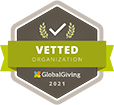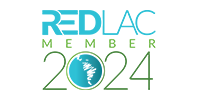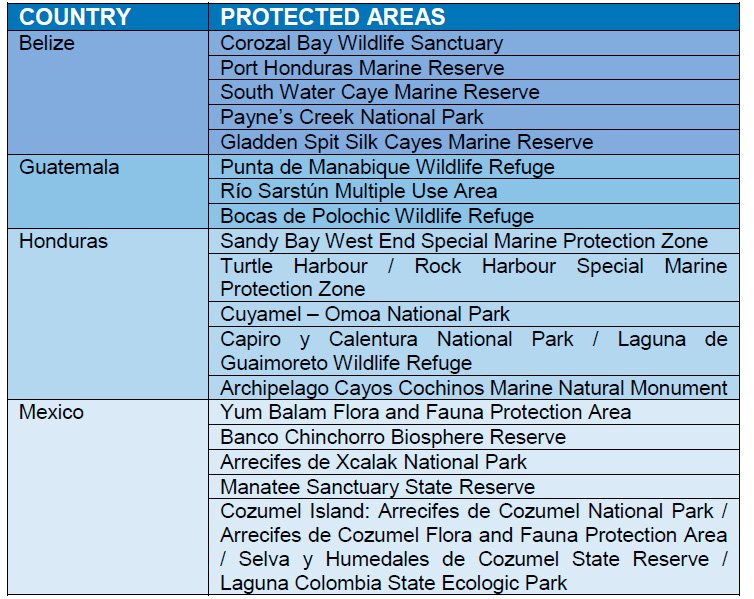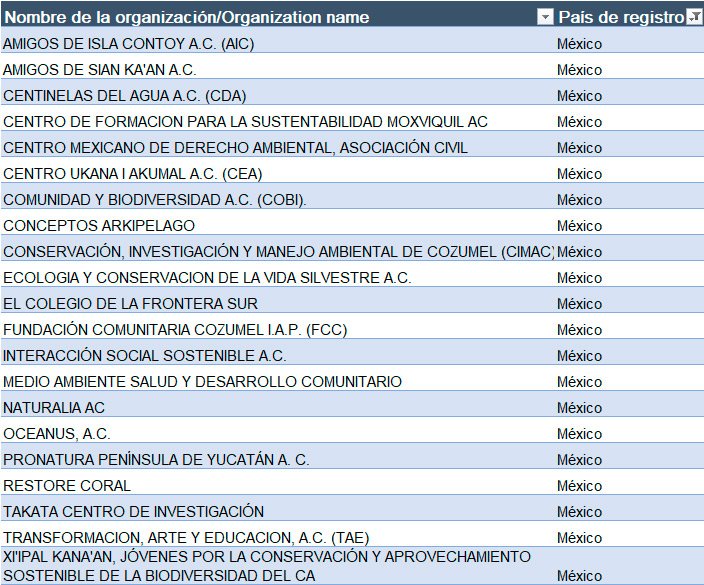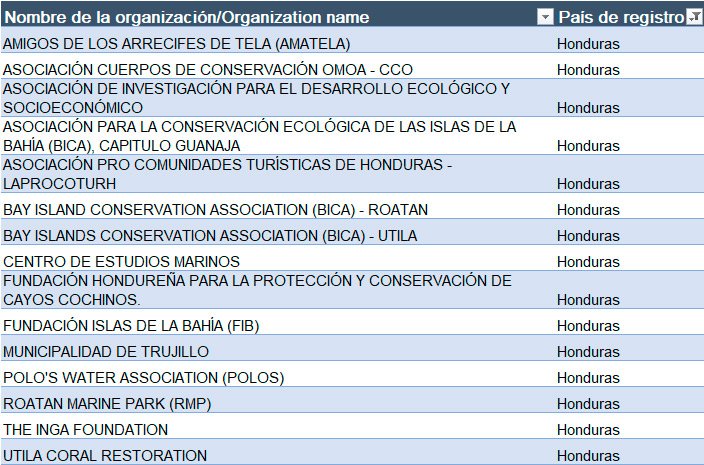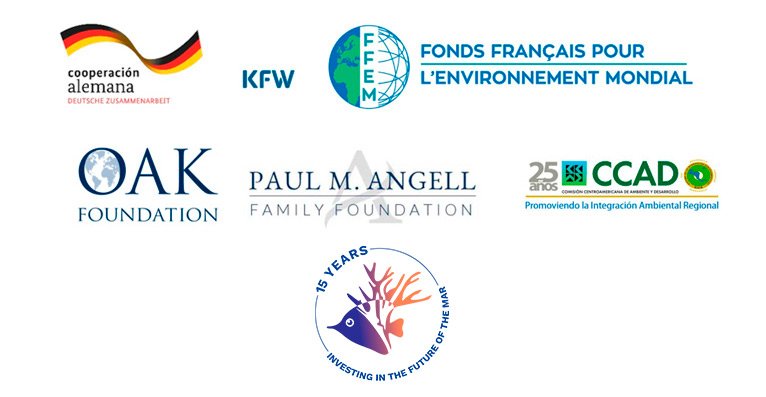
14th REQUEST FOR PROPOSALS
August 30th, 2021
The Mesoamerican Reef Fund is delighted to announce its annual request for proposals (RfP). Once again, three finance windows are available.
This request for proposals will focus on supporting actions to strengthen the resilience of protected areas, coastal communities and NGOs, so they may be better prepared to respond to future events, of natural or anthropogenic origin that, like the current pandemic, caused large-scale economic and social impacts. More information on resilience and actions taken in the region and worldwide can be found in the document “Resilience in the MAR after COVID-19”, attached.
In addition, the finance windows may support other activities, as follows:
1. Traditional Small Grants:
Supporting Coastal and Marine resources management and protection in the Mesoamerican Reef (MAR).
This RfP will continue to support activities related to: 1) Fish spawning aggregation sites (FSAs) and 2) Sewage and solid waste management.
2. Reef Rescue Initiative:
Supporting and strengthening science-based restoration, repopulation and rehabilitation of coral reefs in the MAR region.
On its fifth RfP, the Reef Rescue Initiative will continue promoting and contributing to: 1) new techniques for restoration, repopulation and rehabilitation of coral reefs, and 2) strategies to prevent and address the Stony Coral Tissue Loss Disease. This RfP is not restricted to specific protected areas.
3. Belize Marine Fund:
Collaborating for Sustainable Marine Resources Management in Belize.
The fifth RfP for the Belize Marine Fund will continue supporting marine resources management and conservation in Belize.

1.Traditional Small Grants
Supporting Coastal and Marine resources management and protection in the Mesoamerican Reef (MAR)
The French Global Environment Facility (FFEM), the Government of Germany through KfW, the Paul M. Angell Family Foundation and the Mesoamerican Reef Fund (MAR Fund) are pleased to announce the 14th joint request for proposals. Please find below detailed information on the objectives, eligible applicants, proposal format, deadline, and instructions for proposals presentation.
General objective
To contribute to the conservation of the ecosystem functions of the Mesoamerican Reef System and its resilience.
Specific Objectives
- To support actions to strengthen the resilience of protected areas, coastal communities and NGOs.
- To support and strengthen efforts for waste water and solid waste management.
- To support activities related to effective conservation and monitoring of fish spawning aggregations sites in the region.
Applicants are invited to incorporate, if feasible, the design and/or implementation of market initiatives (those market innovations around untreated waters and solid waste management will be prioritized). Some examples are presented in the table of eligible investments.
As in previous RfPs, community groups are welcome to submit proposals directly.
The following table provides examples of potential eligible investments. However, other type of activities may also be financed. If you are uncertain about a particular activity, please contact Elisa Blanda (eblanda@marfund.org).

The first and second objectives, “To support actions to strengthen the resilience of protected areas, coastal communities and NGOs” and “To support and strengthen efforts for waste water and solid waste management”, apply to the following 18 prioritized coastal and marine protected areas, as well as their areas of influence.
The third objective, “To support activities related to effective conservation and monitoring of fish spawning aggregations in the region” is not restricted to protected areas.
The following criteria will be applied in the revision and selection of proposals. Some projects may not comply with all of the conditions; however, they will be an important element to consider in the final selection. Projects should:
- Demonstrate measurable results on progress of at least one of the stated RfP objectives;
- Coordinate their implementation across multiple stakeholders;
- Strengthen local management capacity of professionals and institutions;
- Contribute to strengthening of local capacities;
- Have transferable or replicable outcomes for other communities/protected areas;
- Engage the MPAs of interest, and be aligned with their management plans and with the institutional priorities of the protected area managers;
- Align with national, regional and/or global strategies or policies;
- Implement actions or activities included in regional plans;
- Have activities that are closely aligned with the applicant organization’s mission and/or are otherwise sustainable beyond the project period;
- Build on current work in the area or successful model projects in the region;
- Create a new source of financing to reduce the financial gap of the MPAs;
- Demonstrate community participation in the proposed activities; and
- Promote collective and/or community resilience.
The proposals to be presented may have a duration of up to two years. Proposals with a duration between 18 and 24 months may request a maximum amount of $50,000, based on project needs and capacity of the implementing institution.
For this RfP, at least 25% of the total budget must come from other sources, as a match to the requested funds. The maximum amount allowed for administration expenses cannot exceed 10% of the total amount requested. Administration expenses refer exclusively to the fixed operating costs of the organization.
For additional information for the Traditional Small Grants please click here.

2. Reef Rescue Initiative
Supporting and strengthening science-based restoration, repopulation and rehabilitation of coral reefs in the MAR region.
The Government of Germany through KfW, the Mesoamerican Reef Fund (MAR Fund) and the Central American Commission for Environment and Development (CCAD) are pleased to announce the fifth request for proposals of the Reef Rescue Initiative. This RfP focuses on coral reefs in the region and is not restricted to specific protected areas.
Objectives
- Support activities and actions to strengthen the resilience of protected areas, coastal communities and NGOs that work on coral reef restoration.
- Promote and contribute new techniques for restoration, repopulation and rehabilitation of coral reefs in the MAR region.
- Promote strategies to prevent and address the coral disease known as Stony Coral Tissue Loss Disease (SCTLD).
This request for proposals is not restricted to protected areas. All coral reefs within the MAR region are eligible. Proposals must clearly justify the site where activities will take place, for the benefit of the Mesoamerican Reef system.
The following criteria will be applied in the revision and selection of proposals. Some projects may not comply with all of the conditions; however, they will be an important element to consider in the final selection. Projects should:
- Demonstrate measurable results on progress of at least one of the stated RfP objectives;
- Coordinate their implementation across multiple stakeholders;
- Have transferable outcomes to sites with potential for reef restoration;
- Strengthen local management capacity of professionals and institutions;
- Contribute to strengthening of local capacities;
- Align with management plans and with the institutional priorities in the case of protected areas;
- Align with national, regional or global strategies or policies;
- Implement actions or activities included in regional plans;
- Have activities that are closely aligned with the applicant organization’s mission and/or are otherwise sustainable beyond the project period;
- Build on current work in the area or successful model projects in the region;
- Create a new source of funding for reef restoration in the region;
- Demonstrate community participation in the proposed activities; and
- Promote collective and/or community resilience
.
The proposals to be presented may have a duration of up to 24 months. The maximum grant amount is $33,000, based on project needs and capacity of the implementing institution.
For this RfP, at least 25% of the total budget must come from other sources, as a match to the requested funds. The maximum amount allowed for administration expenses cannot exceed 10% of the total amount requested. Administration expenses refer exclusively to the fixed operating costs of the organization.
For additional information for the Reef Rescue Initiative please click here.

Additional information for the
Traditional and the Reef Rescue Initiative windows:
The following list includes eligible applicants for this request for proposals:
- Community-based organizations, including fisher groups
- Governmental institutions
- Non-governmental organizations
- Academia and Individuals (both must have administrative support from an NGO, who shall be responsible for the grant).
Potential grantee organizations must be:
- Legally recognized or registered in their country;
- In compliance and good standing with all requirements for operation as a legal local entity;
- Guided by an operational Board of Directors;
- Have a sound financial management system and structure in place (accounting, annual audits, etc.);
- Have a good history as a grantee (i.e. effective grant/project implementation); and
- Have experience in the field of marine resources management.
Organizations must have their headquarters established in any one of the four countries of the MAR region to be eligible.
Community organizations may be supported directly, or indirectly through an NGO, as long as there is an agreement between the two that demonstrates that the community organization is an active participant in the project.
To maximize available resources, proposals involving duplication of funds/efforts funded by other MAR Fund initiatives or programs will not be considered.
Proposals must be submitted through the on-line format on the MAR Fund webpage.
In addition to the proposal, a video of maximum three minutes is requested, in which the objective, the implementers, the activities, the expected results and the proposed impacts of the project are presented in a summarized way.
Attached you will find the proposal format and annexes in Word/Excel to be used as a guideline.
For proponents that can demonstrate lack of Internet availability, proposals may be submitted to the following addresses, depending on the country in which the proposal will be submitted
FOR BELIZE
Protected Areas Conservation Trust
c/o Joyce Tun
2 Mango Street, Belmopan City, Cayo, Belize
Email address: cimanager@pactbelize.org
FOR GUATEMALA
The Mesoamerican Reef Fund
c/o Elisa Blanda
22 Av. 0-59, Zona 15, Vista Hermosa II, Guatemala, Guatemala 01015
Email address: eblanda@marfund.org
FOR HONDURAS
The Mesoamerican Reef Fund
c/o Ana Beatriz Rivas
22 Av. 0-59, Zona 15, Vista Hermosa II, Guatemala, Guatemala 01015
Email address: arivas@marfund.org
&
Fundación Biosfera
c/o Ana Paz
Colonia Bella Oriente, Bloque B, Casa 4503, Tegucigalpa, Honduras
Email address: a.pazfunbio@gmail.com
FOR MEXICO
Fondo Mexicano para la Conservación de la Naturaleza, A.C.
c/o Cintia Landa
Email address: cintia.landa@fmcn.org
The deadline for the submission of proposals is October 25th, 2021. All proposals must be received no later than 11:59 PM in each country on that date.
Each member fund and the MAR Fund central office can provide guidance in relation to the pertinence of the project idea, coherence and structure of the proposal and elements included in the document. It is important to emphasize, however, that the approval of proposals is the exclusive responsibility of the Board of Directors.
Applicants interested in receiving technical support for the preparation of a proposal, especially regarding the Project Development Table, may request an amount of up to US$ 1,000 to hire a consultant through the “Request for support for proposal preparation” form (Annex 1) and send it to the representative of the corresponding member fund at least three weeks prior to the deadline (October 4th, 2021).
The person that will provide the support in each country will schedule one or more Skype/Zoom calls to guide the proponents and work with them on the proposal if they cannot meet in person. The support or assistance process for the development of proposals does not imply commitment for financing the resulting proposal.
Proposals may be submitted in English or Spanish.
Project proposals will be reviewed by the Grants and Evaluation Committee, which will make recommendations to the MAR Fund Board of Directors. The Board is responsible for the final decision on the proposals.
Applicants will be notified of the selection process results in February 2022, through e-mail.
For questions on this request for proposals and the grant process, please contact, the following person
Elisa Blanda
Small Grants Program Officer
eblanda@marfund.org
Skype: elisapone
Requests will be evaluated on a first come first serve basis until available funding has been completely distributed.
- Title of the Proposal:
_______________________________________________________________
- Applicant organization:
_______________________________________________________________
- Exact Physical Address (Community, Neighbourhood, Street, City, Municipality/State, Telephone and e-mail):
_______________________________________________________________
- Country:
_______________________________________________________________
- Protected Area (if applicable):
_______________________________________________________________
- Brief description of the applicant organization and its main activities:
_______________________________________________________________
- Brief description of the project to be submitted for consideration of the MAR Fund: _______________________________________________________________
- Have you submitted proposals to MAR Fund previously? Yes ____ No _____
- If the answer is yes, have these been approved? Yes ____ No _____
Please indicate the project title(s) and year(s) of implementation:
_______________________________________________________________
- Please indicate the amount, in US$, that you require to hire the consultant to prepare the proposal: US$ _________
- Why do you require support for the preparation of the proposal?
_______________________________________________________________
- Who, beside the consultant, will be involved in the formulation of the proposal? (Indicate if permanent staff member(s), manager(s), volunteer(s) and his/her work experience with the applicant organization)
_______________________________________________________________
- Add any information you consider important for MAR Fund to know regarding your organization and/or proposal.
_______________________________________________________________
To download Annex 1 in Word – Click here
Send the complete document to the correspondig member fund and copy (Cc) to eblanda@marfund.org.
Download the proposal format and annexes
Proposals must be submitted (except in particular cases) through the MAR Fund on-line Small Grants Program system. As a first step to follow, each organization should check if it is already registered in our on-line system in the following list:
If your organization is already registered, you can go directly to the system SGP and add a new project.
In the event that your organization is already registered and you do not know or remember the access credential, please contact Elisa Blanda (eblanda@marfund.org) and José Jaime Ruiz (webmaster@marfund.org) for technical support.
If your organization is not registered please register at the following link (https://sgp.marfund.org/forms/en/), completing the organization form. We recommend registering as soon as possible. Upon registration, you will receive a notification email with your on-line access credentials.

3. Belize Marine Fund:
Sustainable Marine Resources Management in Belize
The Belize Marine Fund is pleased to announce its fifth request for proposals. This financial mechanism has been established with technical and financial support from Oak Foundation to provide long-term financial sustainability for high-priority natural resources management and conservation initiatives in Belize. For this financial window, all coastal and marine protected areas in Belize are eligible.
As with the previous financial windows, this call for proposals will focus on supporting actions to strengthen the resilience of protected areas, coastal communities and NGOs.
Broad funding priorities include:
- Strengthen the resilience of protected areas, coastal communities and NGOs;
- Improved management effectiveness of marine protected areas across the national seascape;
- Reduced pressures on the marine resources;
- Effective marketing of Belize’s reef at national and international levels to build awareness and support for its protection and sustainable use;
- Strengthen the work and knowledge on mangroves and seagrasses; and
- Mobilization of new financial resources for the reef system.
General Objective
To support marine conservation and civil society organizations to develop and implement initiatives that address and provide solutions to sustainable resources use and management issues; while working to achieve resilience in the face of ever changing economic, social and resources management-based realities.
Specific Objectives
- To support resource managers in responding to the most pressing of resource management needs in strengthening resilience in communities and coastal and marine protected areas.
- To support improved management effectiveness of MPAs across the national seascape through enhanced water quality monitoring at site and systems level, and support for effective monitoring and conservation of mangrove ecosystems, seagrass beds, fish replenishment zones (FRZ) and fish spawning aggregations sites (FSAs).
- To address the need for sustainable financing in marine resource management by working with key stakeholders to integrate financial planning into areas of conservation planning.
- To support actions for addressing watershed impacts that threaten the integrity and sustainability of coastal and marine resources.
Applicants are invited to incorporate, if feasible, the design and/or implementation of market initiatives.
The Belize Marine Fund is delighted to extend a special invitation to marine conservation NGOs in Belize to submit proposals, within the scope of the established objectives and funding priorities. A list of examples of potential projects follows:
- Improved management effectiveness of MPAs across the national seascape (for example, efforts that contribute towards ensuring MPAs meet critical operational, equipment and infrastructure costs; effective management practices of the network of coastal and marine protected areas; investments in initiatives that result in strengthened, engaged and functional MPA stakeholder groups; projects that promote an enabling environment for improved transparency and strengthened surveillance and enforcement; and investments in capacity building for MPA personnel).
- Improved financial sustainability of the MPA system or co-management organizations (for example, investments in NGO financial sustainability mechanisms based on sound business plans; and investments in the provision of an enabling environment and portfolio of projects for piloting impact investment in Belize). It can include the promotion and strengthening of strategic alliances and community networks.
- Increased climate change resilience (for example, investments in climate smart approaches to reef and mangrove restoration and resilience; efforts towards coastal communities’ risk reduction and resilience (e.g. strengthening food security, creating financial inclusion, projects to promote subsistence, education); and investment in efforts for increased environmental sustainability and climate smarting of coastal/caye development).
- Sustainable income diversification opportunities for fishers/fishing communities (for example, strategic investments in income diversification initiatives based on sound investment strategies and successful models; and investment in adding value/follow-on funding for expansion of successful income diversification investments). Incentivize the role of the women in the community through productive activities.
- Improved stewardship and support for enhanced and effective marketing of Belize’s reef at local and national levels (for example, revised valuation of the ecosystem services provided by Belize’s reef, mangroves and seagrass; support for initiatives/actions that result in improved prioritization of marine resource management on the national agenda; investments in effort to improve local and national awareness and stewardship of Belize’s reef and coastal ecosystems and support for improved engagement of tourism sector / private sector as active stewards of Belize’s reef and coastal ecosystems).
- Effective implementation of managed access (for example, support for the established package of fish replenishment zones, expansion and operationalization of replenishment zones; continued engagement of fishers towards support of managed access and functional managed access committees; projects that contribute towards multi-year monitoring programmes/research to inform management and adaptive management; and support for fishers in moving towards value-added fishing and product traceability). It includes projects that focus on protection, monitoring and surveillance of FSA.
- Reduced watershed impact (for example, support for river to reef strategies that address watershed impact, solid waste and sewage management; and support for improved water quality monitoring at the site level and across the MPA system). It can include investments related to regenerative economy (e.g. transforming solid waste into products).
The following are considered eligible applicants for the request for proposals:
- Not-for-profit organizations,
- Community-based organizations, including fisher’s groups, and
- Education/academia, or scientific organizations.
Potential grantee organizations must be:
- Legally recognized or registered in Belize;
- In compliance and good standing with all requirements for operation as a legal local entity;
- Guided by an operational Board of Directors;
- Have a sound financial management system and structure in place (accounting, annual audits, etc.);
- Have a good history as a grantee (i.e. effective grant/project implementation); and
- Have experience in the field of marine resources management.
The Belize Marine Fund (BMF) also seeks eligible organizations that submit projects that meet the following criteria:
- Can demonstrate measurable results on progress of at least one of the stated RfP objectives;
- Coordinate their implementation across multiple stakeholders;
- Strengthen local management capacity of professionals and institutions;
- Contribute to strengthening of local capacities;
- Have transferable or replicable outcomes for other communities/protected areas;
- Work to address (root causes of) some of Belize’s and the region’s most pressing environmental and marine resources management challenges;
- Can be replicated locally, nationally and across broad geographical locations;
- Incorporate plans (considerations) for long-term sustainability of the work;
- Are of a collaborative nature;
- Build on broader national/regional projects and initiatives for Mesoamerican Reef management and conservation;
- Have secured other sources of matching funds from entities not affiliated with the Belize Marine Fund;
- Respond to national, regional or global conservation plans/goals;
- Have activities that are closely aligned with the applicant organization’s mission and/or are otherwise sustainable beyond the project period;
- Build on current work in the area or successful model projects in the region; and
- Promote collective and/or community resilience
.
Project proposals may last up to 18 months if they are aimed at promoting sustainable income-generating activities for local FSA communities and/or resilience initiatives. Projects on other topics will have a duration of 12 months. The maximum grant amount is US$30,000, based on project needs and capacity of the implementing institution.
For this RfP, at least 25% of the total project budget must come from other sources, as a match to the requested funds. The maximum amount allowed for administrative costs cannot exceed 15% of the total amount requested. Administration expenses refer exclusively to the fixed operating costs of the organization.
The deadline for the presentation of proposals is October 25th, 2021. All proposals must be received no later than 11:59 PM, Belize.
Proposals must be submitted through the on-line format on the MAR Fund webpage.
In addition to the proposal, a video of maximum three minutes is requested, in which the objective, the implementers, the activities, the expected results and the proposed impacts of the project are presented in a summarized way.
Attached you will find the proposal format and its annexes in Word/Excel to use as a guide. For organizations or groups that can demonstrate lack of Internet availability, proposals may be submitted to the Belize Marine Fund Project Officer, Angeline Valentine, at avalentine@marfund.org.
Proposals and proposal ideas can be discussed with the BMF Project Officer and/or the MAR Fund Executive Director by email or phone if presented at least three weeks prior to the deadline (by October 4th, 2021). The Project Officer can provide guidance in relation to the pertinence of the project idea, coherence and structure of the proposal and elements included in the document. It is important to emphasize, however, that the approval of proposals is the exclusive responsibility of the Belize Marine Fund Steering Committee
Proposals are to be submitted in English.
Project proposals will be reviewed by the Belize Marine Fund’s Grants and Evaluation Committee, which will make recommendations to the Steering Committee. The Steering Committee is responsible for final determination of the proposals.
Applicants will be notified of the selection process results by the end of February 2022 through email.
For further questions on this request for proposals and the grant process, please contact:
Angeline Valentine
Project Officer
Belize Marine Fund
avalentine@marfund.org
Tel: (501) 615-9645
Download the proposal format and annexes
Proposals must be submitted (except in particular cases) through the MAR Fund on-line Small Grants Program system. As a first step to follow, each organization should check if it is already registered in our on-line system in the following list:
If your organization is already registered, you can go directly to the system SGP and add a new project.
In the event that your organization is already registered and you do not know or remember the access credential, please contact Elisa Blanda (eblanda@marfund.org) and José Jaime Ruiz (webmaster@marfund.org) for technical support.
If your organization is not registered please register at the following link (https://sgp.marfund.org/forms/en/), completing the organization form. We recommend registering as soon as possible. Upon registration, you will receive a notification email with your on-line access credentials.

Partners of the three finance boxes
KfW
The KfW is the German government-owned Development Bank based in Frankfurt. Its name originally comes from “Reconstruction Credit Institute”. It was established in 1948 after World War II as part of the Marshall Plan. The purpose of the institution is to support the economy, society and ecology at a worldwide level. It supports the sustainable improvement of economic conditions and well-being in medium class lifestyle, natural resources protection, infrastructure, education, project and export financing and cooperation for development. As of 2018, it is Germany’s third largest bank by balance sheet. It covers over 90% of its borrowing needs in the capital markets, mainly through bonds that are guaranteed by the federal government. This allows KfW to raise funds at advantageous conditions. Its exemption from having to pay corporate taxes due to its legal status as a public agency and unremunerated equity provided by its public shareholders allow KfW to provide loans for purposes prescribed by the KfW law at lower rates than commercial banks.
FFEM
The French Global Environment Facility (FFEM) was established in order to promote a sustainable global environment and works all across Latin America, Africa and Asia in the protection of ecosystems. Their work primarily involves dealing with climate change and protecting the ozone layer, biodiversity, marine protection, and protecting land from degradation. The FFEM has worked in various national parks in these continents with other global environmental groups such as the World Wide Fund for Nature, funding the protection of areas of ecological vulnerability. It has also done much work in the Indian Ocean islands such as the Seychelles.
Paul M. Angell Family Foundation
In 1996, David and Lynn created a family foundation to administer their philanthropic efforts. For them, philanthropy was an extension of their natural inclination to help people, knowing that sometimes people need a hand. Helping others was a principle they took seriously and enjoyed immensely, and their motivations sprang from deep, spiritual desire to make a difference in the world. The Foundation promotes high-impact programs that help people achieve self-sufficiency and well-being by providing them with basic necessities and economic stability.
Oak Foundation
Oak Foundation commits its resources to address issues of global, social and environmental concern, particularly those that have a major impact on the lives of the disadvantaged. It was formally established in 1983. Early grants were made in Denmark to organizations supporting single mothers and torture victims (1983) and in Zimbabwe to groups supporting vulnerable children and families, primarily at community levels (1984).
Grants continued to be made annually in several countries until a new phase for Oak Foundation began in the early 1990s, when annual grant-making increased, and staff were hired to run substantive programs. It currently has offices in Europe, Africa, India and North America, and makes grants to organizations in approximately 40 countries worldwide.
Central American Commission for Environment and Development (CCAD)
The Central American Commission for Environment and Development (CCAD) is the organ of the Central American Integration System (SICA), which is responsible for the environmental agenda of Central America. Its objective is “to contribute to the sustainable development of the Central American region, strengthening the cooperation and integration regime for environmental management”. The CCAD seeks the appropriate way to make national policy and legislation guidelines compatible with strategies, in order to establish collaboration among the countries of the region to jointly seek the adoption of sustainable development practices.
Mesoamerican Reef Fund
The Mesoamerican Reef Fund (MAR Fund) is a private regional environmental fund established to support conservation and sustainable use of natural resources in the Mesoamerican Reef as a single ecosystem and ecoregion. Its mission is to drive regional funding and partnerships for the conservation, restoration, and sustainable use of the Mesoamerican Reef. It was established by four pre-existing environmental funds, one from each MAR country: Protected Areas Conservation Trust (PACT) in Belize, Fundación para la Conservación de los Recursos Naturales y Ambiente en Guatemala (FCG) in Guatemala, Fundación Biosfera (FB) in Honduras, and Fondo Mexicano para la Conservación de la Naturaleza (FMCN) in Mexico. (www.marfund.org).


